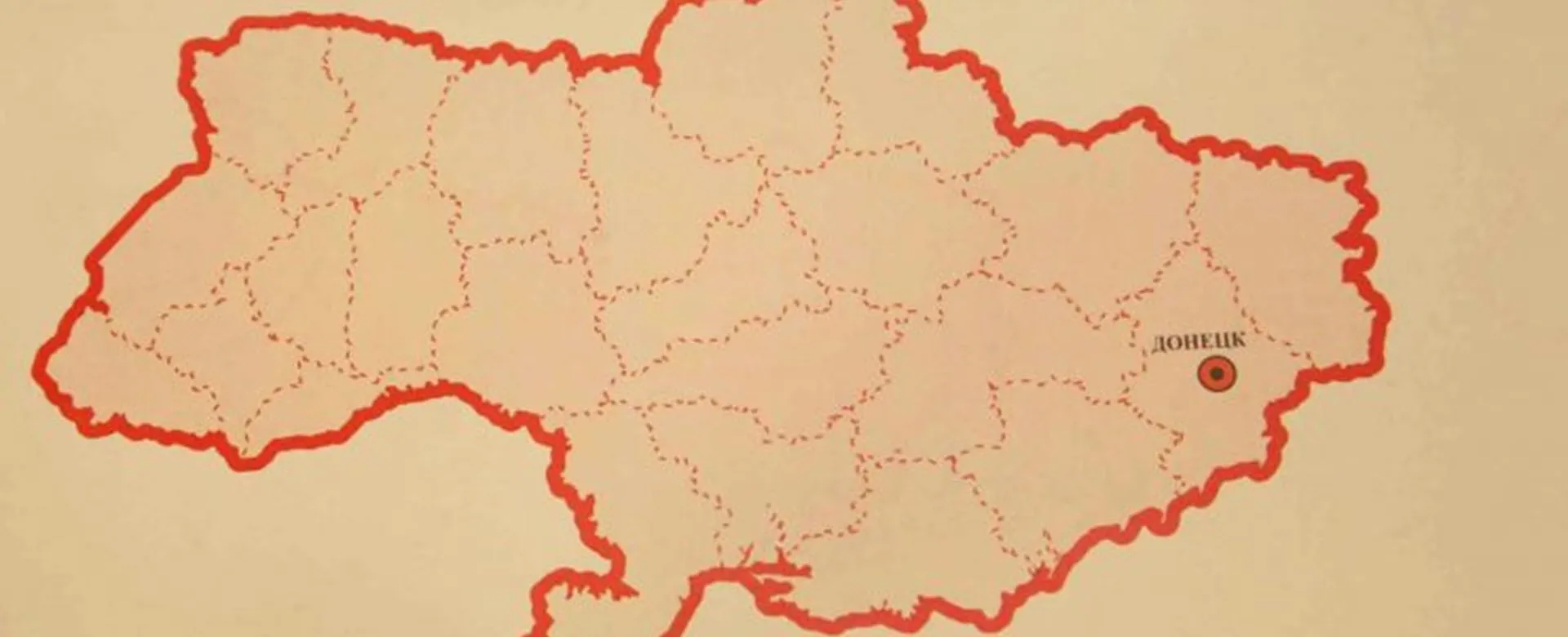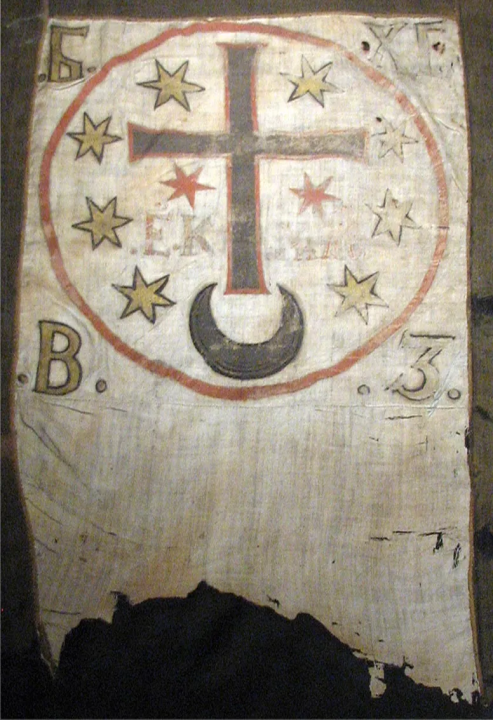From “Malorossiya” With Love?
How separatists in Donetsk tried to announce a new country called ‘LittleRussia’
From “Malorossiya” With Love?
Share this story

BANNER: The “territory” of the self-declared state of “Malorossiya.” (Source: tjournal.ru)
On July 18, the president of the self-declared “Donetsk People’s Republic” (DNR), Aleksandr Zakharchenko, announced the creation of the new government of “Malorossiya,” which translates to “Little Russia.” The new “government” of Malorossiya not only claims to include the separatist-held territory in the Donbas and to replace the region previously dubbed Novorossiya, or “New Russia,” but also it intends to abolish the current Ukrainian state and move the capital to Donetsk. Zakharchenko called Ukraine a failed state, and proposed that the new Malorossiya state replace it, giving greater autonomy to the various oblasts and granting Kiev “special status as a historical-cultural center.”
The “constitution” of Malorossiya was shared on Twitter, with, as noted by Guardian journalist Shaun Walker, the “red squiggly lines of Word spell-checker” still in the document.
Официально…
Создание нового государства – Малороссии. Конституционный акт.#Малороссия #АктыМалороссии pic.twitter.com/WT3l7PmEAP— Донецкая Республика (@dnrpress) July 18, 2017
Zakharchenko also unveiled the flag of this “state,” which borrows from the banner of 17th-century Ukrainian Cossack Bohdan Khmelnytsky.


This announcement came as a surprise not just to Ukrainians, but also to Russians and others around the world. It goes without saying that Ukraine and the West did not take the announcement seriously. For example, a German official called the move “totally unacceptable,” and a Ukrainian commander said that Ukraine would “bury” Malorossiya.
But what about Russians and separatist officials who were caught off guard by the “creation” of Malorossiya? Furthermore, who orchestrated the “creation” of Malorossiya, if influential Russian and separatist officials were not aware of the announcement before today?
The Russian reaction
While Russia has backed many of the political maneuvers made by the self-declared separatist republics, there have been mixed reactions to Zakharchenko’s announcement regarding Malorossiya. Boris Gryzlov, Russia’s representative to Contact Group in Ukraine, came out strongly against the “Malorossiya initiative” in a quote to Interfax:
This initiative does not fit into the Minsk process, and I take it only as an invitation to a discussion. The declaration has no legal consequences.
Gryzlov also noted that this “initiative” is just part of the ongoing information war between Ukraine and the Russian-led separatist forces, and is not a real piece of political reform.
A leading Russian Duma deputy, Leonid Kalashnikov, tepidly criticized the move, while also expressing sympathy toward Zakharchenko’s intentions and affirming his support of the self-declared separatist republics:
On one hand, Russia will demand compliance with the Minsk agreements, but at the same time we cannot forget that [the agreements] are not being implemented by Ukraine. On the other hand, I understand Zakharchenko in a human way.… As the head of the committee [State Duma Committee on International Affairs], I cannot support this, but as a human, as a communist, as a deputy, I have long called for Russia to recognize these states.
In a separate interview to Sputnik, Kalashnikov was more receptive to the idea of Malorossiya. He stated:
…The international community will be against it. Some countries will turn a blind eye to it. Russia will be positive towards this idea.
Russian Presidential Press Secretary Dmitry Peskov did not offer an assessment of Malorossiya. He said that he preferred to “refrain from commenting” on the surprise announcement, adding that additional analysis and thought is needed first, and that the “Russian side remains committed to the Minsk accords.”
Aleksey Chesnakov, a former leader of the United Russia party and the current director of the Center for Current Politics, provided more information on the sudden formation of Malorossiya in a recent statement. Chesnakov, who is believed to be a close associate of Vladislav Surkov, a top-level Kremlin advisor, explained that the Malorossiya “initiative” is only symbolic:
The project for the creation of Malorossiya was put forward by a number of the writers and bloggers close to the leadership of the DNR. In the DNR leadership itself, many consider this project non-serious. Therefore, this project is more literary than political. The Malorossiya initiative has little relation to real politics.
The separatist reaction
Like the Russian reaction, the response from separatists in both the Donetsk and Luhansk areas was mixed. Soon after Zakharchenko’s announcement, a leading official in the self-declared “Luhansk People’s Republic” (LNR) expressed surprise at the formation of Malorossiya:
The Luhansk People’s Republic did not send any of its own official delegates to Donetsk for participation in the meeting of representatives of regions of Ukraine. Moreover, we were not even informed about their intentions to hold this event, and the issue was not coordinated with us.
Echoing Chesnakov’s comments on the project’s being thought up by the “literary” nexus of the DNR, writer and separatist commander Zakhar Prilepin (profiled by the @DFRLab here) provided an illuminating interview to Komsomolskaya Pravda’s Aleksandr Kots. The entire interview is worth review, as it seems to answer the central question of why this announcement of Malorossiya came so suddenly, and what the goal of the announcement is:
Aleksandr Kots: For you, was this statement unexpected?
Zakhar Prilepin: No, we really wanted to create a surprise not only for Moscow, but also for Washington, and for Kiev, first of all. And for Odessa. And for Kharkiv. And I see what is happening. People still entirely understand the historicism of this event, but I think that some officials will stand at a window in Kiev and jump out, screaming “The Russians are coming!”
Kots: Zakhar, explain: What is this for, and why exactly now?
Prilepin: Well, because the topic is long overdue. Because we are watching the suicide of Ukraine for all of these three years and have solved the current military problems, diplomatic problems, and political problems, and others. And accumulated strength. Now, Donetsk is absolutely serious on all grounds to say that it is able to assume the functions of the capital and is ready to ensure law and order with the help of its armed forces on any part of the territory of Malorossiya.
Kots: Zakhar, what regions have joined Malorossiya at this time? From which ones were there representatives?
Prilepin: I think that there were representatives from all of the regions, but they spoke from Kiev, from Odessa, from Dnepropetrovsk, from Kharkiv.
Kots: Malorossiya will be within which borders? And right now it is within which borders?
Prilepin: Zakharchenko said that we will also not be giving up L’viv. It is within the borders of the present, or what until today was called Ukraine. And ahead is just the question of establishing administrations….
Kots: Is it correct to say that the LNR and DNR have been united into one state?
Prilepin: No, I think it’s too early. Well, Donetsk announced that it is ready to take on the functions of the capital. And there are some separate questions concerning Luhansk, Poltava, and Zaporozhye, that I think we will discuss.
Kots: What will happen to the Minsk agreements?
Prilepin: The constitutional act that we announced and unanimously adopted is, in fact, absolutely in line with the Minsk agreements. Furthermore, Donetsk has extended a number of preferences that we have that are in accordance with the Minsk agreements, in order to create a common statehood. First, we will, in fact, cease to be separatists, and they will not be able to call us that anymore, because we will be in favor of unified statehood. And we’re certainly not going to be “terrorists” anymore, because we are in favor of a peaceful resolution of the issue, and we have even proposed the necessary document for this. Donetsk has turned down many advantages in order to simply dissolve into the larger Malorossiyan state.
Kots: That is, there is already a course not to join Russia, but instead to become an independent, large state?
Prilepin: This is an independent state, which, of course, now has set its task to create a unified state of Malorossiya, Belarus, and Russia.
This interview seems to answer many of the unexplained questions raised by the Russian and separatist reactions to the creation of Malorossiya: Why was this suddenly announced? Why were Luhansk officials not aware of a new state that is ideologically aligned to them and that geographically includes them? How was the “literary” scene of Donetsk involved in the idea for Malorossiya?
The concept of Malorossiya was seemingly created by Zakhar Prilepin — an influential figure and a celebrity in the DNR — and likely by a number of Russian supporters and curators close to him and his circle. Prilepin’s conception of how Malorossiya will function and be received appears either delusional or grandstanding, as even Russian officials have been wary about the idea of this project. Even Leonid Kalashnikov admitted that the creation of such a state would not adhere to the Minsk accords. It is unclear how long Zakharchenko, Prilepin, and other Donetsk-based figures will continue to push their fictional state, but it is clear that any moves to enact the establishment of Malorossiya have no chance of success, and would be in clear violation of the Minsk agreement.

